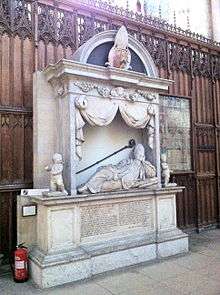Richard Sterne (bishop)


Richard Sterne (c. 1596–1683 born in Mansfield, Notts) was a Church of England priest, Archbishop of York from 1664 to 1683.
He was educated at Trinity College, Cambridge, where he graduated MA in 1618, BD in 1625 and DD in 1635.[1] He was elected a fellow of Benet College (now Corpus Christi College), Cambridge in 1623 and then served as Master of Jesus College, Cambridge from 1634.
In c.1633, Sterne became chaplain to Archbishop Laud. From 1642 he held the rectories of Yeovilton and Harleton. A Royalist, he was arrested and imprisoned by the Parliamentarians later the same year. In 1644 he was formally dismissed as Master of Jesus and in 1645 he lost his rectories, although he was released from prison.
At the Restoration in 1660, Sterne was appointed Bishop of Carlisle, from where he was translated to York in 1664. He is said to have been one of those who assisted in revising the Book of Common Prayer in 1662. He also assisted Brian Walton with the English Polyglot Bible and himself wrote Summa Logicae (published posthumously in 1685). He founded scholarships at both Corpus Christi and Jesus Colleges.
His great-grandson Laurence Sterne attended Jesus College, Cambridge, and would find literary fame in the 1760s as author of The Life and Opinions of Tristram Shandy, Gent. and live as a curate and parson in Yorkshire.
References
- ↑ "Sterne, Richard (STN611R)". A Cambridge Alumni Database. University of Cambridge.
| Academic offices | ||
|---|---|---|
| Preceded by William Beale |
Master of Jesus College, Cambridge 1634–1644 |
Succeeded by Thomas Young |
| Preceded by John Worthington |
Master of Jesus College, Cambridge 1660-1655 |
Succeeded by John Pearson |
| Church of England titles | ||
| Preceded by James Ussher vacancy from 1643 |
Bishop of Carlisle 1660–1664 |
Succeeded by Edward Rainbowe |
| Preceded by Accepted Frewen |
Archbishop of York 1664–1683 |
Succeeded by John Dolben |